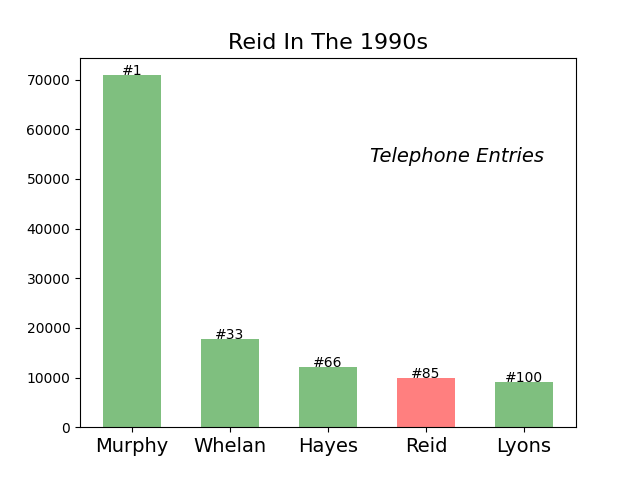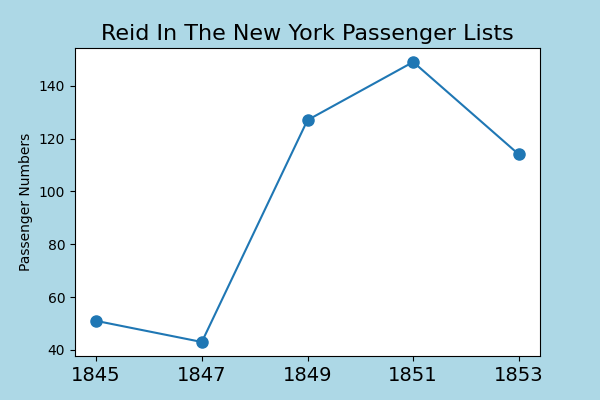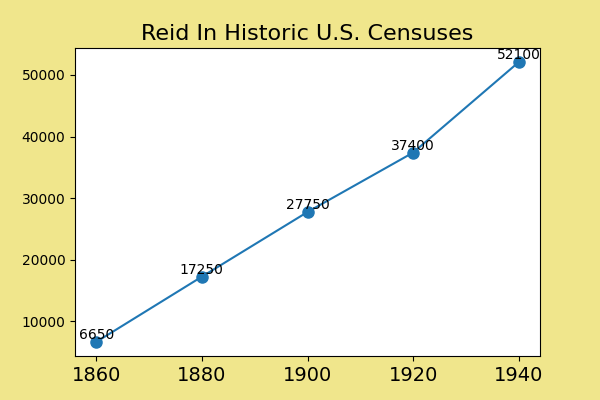This article looks at how common Reid is as a last name in Ireland and the United States from the 19th century to the present day.
You’ll learn the meaning and origins of the Reid surname while exploring some notable and famous people that held it.
I use census records, emigration lists, and military archives to uncover fascinating patterns. If you’re studying your genealogy, check out my sources at the end of the post so you can do your own research.
How Common Is Reid As A Surname In Ireland?
Detailed current statistics about surnames are not publicly released by the Irish government. Instead, they offer the ten most frequently occurring surnames among newborns in the previous year. Reid
So, I had to look elsewhere for population estimates. Thankfully, an Irish genealogist researched the prevalence of Irish surnames through national phone directories published in the 1990s. Seán Murphy’s estimates aren’t as robust as a census but give a good broad estimate.
Reid was ranked 85 in the top one hundred names in this decade with a total of 10,000 entries.
This graphic shows how it ranks compared to the 1st, 33rd, 66th, and 100th entries in the survey:

Reid In The Early 1900s
Only the full censuses from 1911 and 1901 in Ireland are available to the public. Earlier decades were either destroyed by the government (to make room for more storage) or by a huge fire during the Irish Civil War. Later decades are unavailable under privacy laws.
So, let’s concentrate on the early decades of the twentieth century.
I used online archives to calculate the total numbers by surname. I consider these estimates due to some percentage of transcription errors. So, I’ve rounded the numbers to the nearest fifty.
There were 6,750 residents named Reid on the island in 1911.
Ten years earlier, Reid had about 6,750 residents in the 1901 census.
Population Estimates In The 1890s
A study of Irish surnames was conducted in 1890 by the head of the Civil Registrations Office. It was published as a “Special Report on Surnames In Ireland.”
The survey estimated that there were about 9,200 people named Reid in the country.
Emigration To America After The Irish Famine
The Irish have traditionally emigrated to Britain, the U.S., Canada, and Australia in recent centuries. They were driven by various factors like political upheaval, scarcity of work, and food deprivation.
The largest wave of emigration to the United States occurred during the 19th century. The peak was in response to the Great Irish Famine, which took place between 1845 and 1852. A plant disease devastated the main food and income crop for much of the population.
I reviewed the Reid name in the shipping passenger lists arriving in New York during this period. The departures were from both Ireland and England.
This picture shows how the numbers rose and fell in the years after the famine:

How Common Is Reid As A Last Name In The U.S.?
Based on the 2010 U.S. census, the name Reid ranks about 275 among Irish names in America with 111,360 bearers.
Although the 2010 census has exact numbers and rankings, the rank I assign here is my estimate. If you’re curious about how I got there, here’s a brief explanation…
Estimating Rank In The United States
Historically, some Irish families with Gaelic surnames took English-sounding names as translations under the influence of colonization.
As these names also have English origins, they will have been brought to the United States by both British and Irish immigrants. Because the census doesn’t ask about specific European origin (e.g. England vs Ireland), it’s impossible to identify the proportion with Irish heritage.
I reviewed the census to identify which names are predominantly Irish in origin. In order to estimate the relative rankings of “Irish” names, I’ve mostly excluded surnames that have varying origins.
Reid In Historic Times
It is fascinating to examine how the prevalence of a surname shifts over the course of time in a country as young as the United States. As well as immigration, this reflects other demographic shifts across the nation. Factors include higher child mortality rates and longer life expectancy.
The historic census records have been transcribed and digitized. I used online archives to run counts of surname populations.
But the totals can’t be exactly accurate due to transcription errors. So, I’ve rounded the numbers to the nearest 50 in the graph below.
This picture shows the numbers every twenty years from 1860 to 1940:

These are the numbers in the graph:
- 1860: 6,650
- 1880: 17,250
- 1900: 27,750
- 1920: 37,400
- 1940: 52,100
Reid In World War II
About 8.3 million men and women enlisted in the U.S. Army during the Second World War. Many were of Irish heritage, and some were born in Ireland.
There were registration records for 3,501 soldiers named Reid who enlisted between 1938 and 1946.
There were 14 who were born in Ireland.
Reid Surname: Meaning And Origin
The surname Reid has several different origins. It can be Scottish, English, or Irish.
The Irish name can come from the Gaelic surname Ó Maoildeirg, which means “descendant of Maoldearg”. The personal name Maol Dearg derives from words referring to “the red chief”.
The connection to the name Reid comes from how it sounds like “red”.
Famous Or Historic People Named Reid
Here are some notable people with the family name:
- Thomas Mayne Reid (1818 – 1883): born in County Down, he emigrated to New Orleans in 1840 and then moved to Tennessee. After moving to England, he wrote plays and novels largely based in the southern states of the U.S.
- Daniel Gray Reid (1858 – 1925): an American businessman from Indiana who made his fortune from manufacturing tin plate. He bought up all the other tin plate companies in America to form a giant enterprise which he sold to J.P. Morgan in 1901 for $18m.
Sources

External Research
The Ireland 1990s estimates are from Seán J. Murphy’s research paper.
The population estimates of 1890 are based on the “Special Report on Surnames in Ireland“, published in 1909.
The population figures for the 2010 U.S. Census come from a file provided by the U.S. Census Bureau.
Internal Research
Some of the population numbers are based on my own research and calculations using online archives. I’ve rounded those numbers to the nearest 50 to account for transcription errors and other technical issues with online databases of this type.
The Irish census estimates for 1901 and 1911 are my calculations based on the Irish National Archives
I plotted the emigration figures from 1845 to 1854 based on calculations from the archives of the New York Passenger Lists (1820-1957).